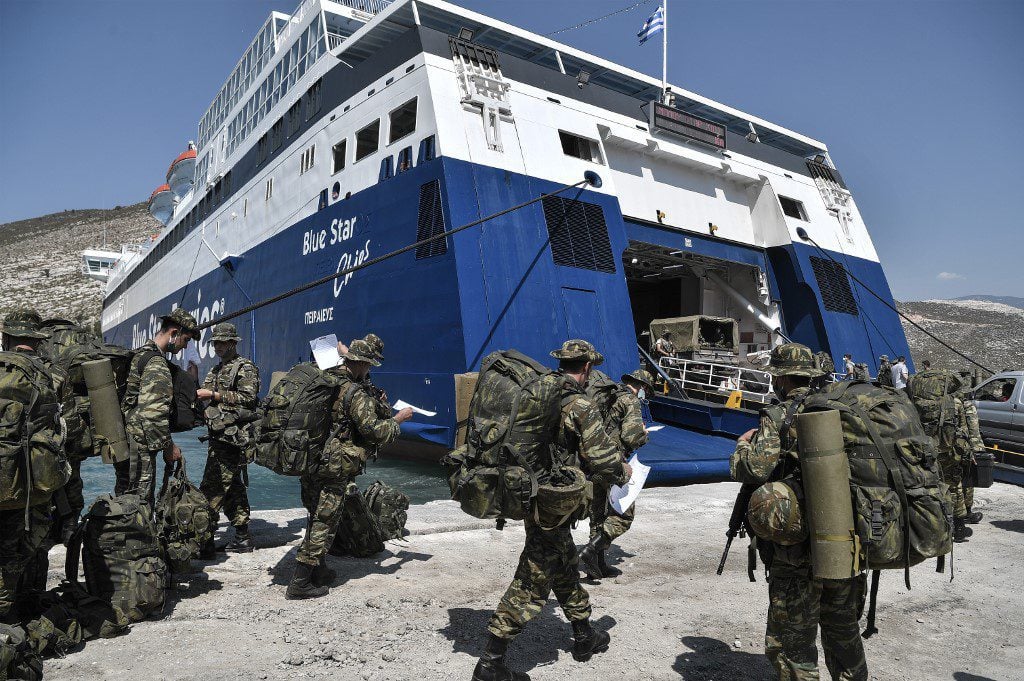
By: Mat Nashed
Turkey’s deep distrust of western allies and Arab adversaries have compelled it to adopt an aggressive foreign policy. Most recently, Turkey made headlines for supporting Azerbaijan’s offensive on Nagorno-Karabkh, an autonomous region controlled by Armenian-backed ethnic separatists. The violence has prompted the global community to call for a ceasefire, but Ankara is escalating the conflict by militarily supporting Azerbaijan.
Turkey’s reaction is consistent with its recent foreign policy behavior. And while the civilian toll in Nagorno-Karabkh is proving catastrophic, Turkey’s drilling for gas discoveries in the Mediterranean remains the most contested issue for many of its regional foes and allies.
Tensions between Greece and Turkey have particularly boiled over in recent months. In brief, Athens believes that the Greek islands dotting the Turkish coastline bestows it with territorial rights. However, Ankara has long maintained that Greek islands should not have access to exclusive economic zones (EEZs). Turkey’s argument is rooted in previous international rulings that prevented islands from claiming exclusive maritime boundaries, as was the case in a 1982 dispute between Libya and Tunisia.
Cyprus and Turkey are also at loggerheads over gas discoveries in the Mediterranean. The conflict dates back to 1974 when Turkey invaded Northern Cyprus following a Greek backed coup on the island. The invasion effectively split the island in two, with the international community recognizing the government in the south as the sole authority on the island. As a result, the southern government in the city of Nicosia claims maritime rights for the whole island.
But Ankara doesn’t acknowledge that southern Cyprus has rights to an EEZ beyond 12 nautical miles off its coast. It believes that maritime boundaries should be divided between the administration in the south of Cyprus and the Turkish backed administration in the north. It also argues that Nicosia’s claim to maritime boundaries infringes on its own EEZ that extends southward from the Mediterranean coast.
To compound the issue, Ankara refuses to sign the U.N Convention on the Law of the Sea, which would normally be utilized to settle such disputes. Instead, the disagreement reached a boiling point last year after Turkey extorted a Memorandum of Understanding (MOU) with Libya’s internationally recognised Government of National Accord (GNA).
That agreement was born out of the Libyan civil war, which saw rouge General Khalifa Haftar’s eastern forces wage an assault on the capital of Tripoli in April 2019. The offensive was accompanied by UAE air support and mercenaries from the private Russian security company the Wagner Group.
Haftar’s assault on the capital prompted the GNA to turn to Turkey for help. Ankara came to the rescue of the GNA by deploying sophisticated drones and Syrian mercenaries. In return, the MOI delineated a maritime boundary between Turkey and Libya that cut through the Greek islands of Crete, Rhodes and Kastellorizo.
Greece was outraged at the agreement and subsequently expelled Libya’s GNA ambassador. Egypt, Israel, Cyprus, and France were also angered because the MOI undermines plans to create an underwater pipeline that would funnel natural gas from Egypt and Israel to Europe.
Turkey’s move thus compelled its rivals to create the EastMed Gas Forum, which many experts say is the equivalent of the “Opec of Mediterranean gas.” Egypt spearheaded the initiative, which saw six states sign onto an energy forum to confront what Cairo described as Turkey’s ‘violation’ of its economic rights.
The EastMed Gas forum intends to foster political and military cooperation to designate maritime boundaries and stop Ankara from carving into the region’s natural resources. Greece, Israel, Italy, Egypt, the Palestinian Authority and Jordan are all members. France has also requested membership, while the U.S wishes to be a permanent observer.
The forum, however, may merely compel Turkey to double down on its assertive foreign policy. The Justice and Development Party (AKP), which Erdogan heads, has previously blasted former rulers for cozying up to western powers at the expense of Turkey’s interests. Erdogan has thus promised to restore Turkey’s imperial legacy by making it an influential regional player. Ankara’s distrust of its European allies is particularly rooted in its exclusion from the EastMed Forum and the EU.
Tension over the Mediterranean could result in clashes between NATO allies. That was nearly the case when a French frigate had a standoff with three Turkish war vessels on June 10. France was attempting to enforce a U.N arms embargo on Libya, which has been criticized for only cracking down on Turkey’s sea shipments. The embargo does not impede the transportation of weapons by flight, which is how the UAE, France, and Russia aid Haftar’s forces. Nevertheless, the French vessel had stopped a Tanzanian cargo ship that was suspected of carrying weapons to Libya.
But a Turkish ship accompanying the Tanzanian vessel had threatened the French frigate with its target radar, prompting the French crew to put on their bullet-proof vests and take up defensive positions with their light weapons. Clashes were barley averted, while Turkey later claimed the Tanzanian ship was carrying aid, not weapons.
Whatever was inside the cargo, Turkey has made no secret about its ambition to strengthen its navy. Already equipped with domestically produced surface ships and submarines, larger warships are due by next year.
The EU has responded by threatening to impose sanctions on Turkey for its unilateral actions in the Mediterranean. But Turkey calculates that its NATO membership shields it from serious consequences. Time will tell if that’s true.
For now, Erdogan shouldn’t be alienated or rewarded for bullying his allies and foes. The EU should instead cooperate and compromise with Turkey to address their mutual interests. The bloc must overcome internal divisions before making any genuine attempt to do so. It must also accept that Erdogan will parade any concession from Europe to his domestic base. That’s a small price to pay to avert a war in the Mediterranean.


